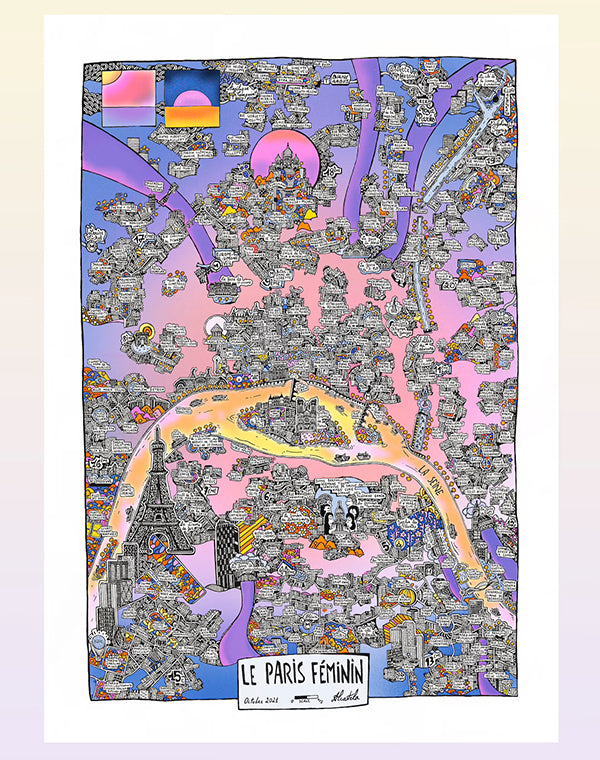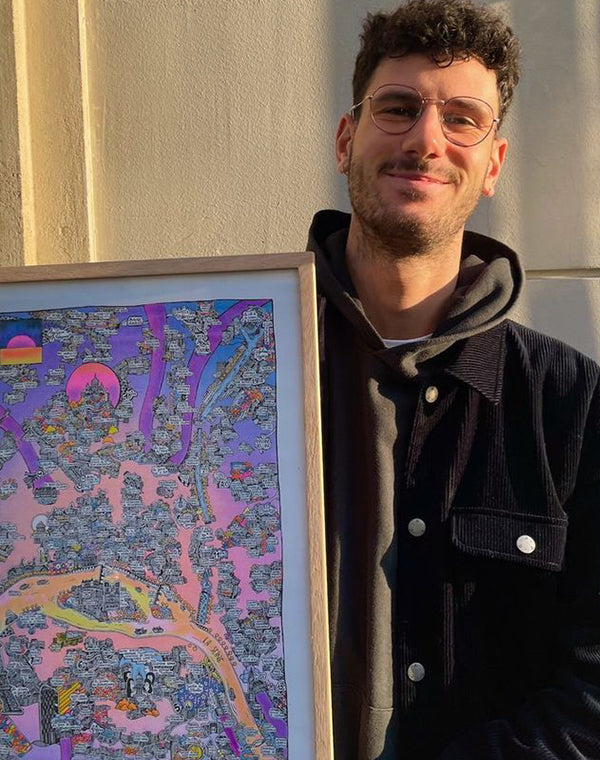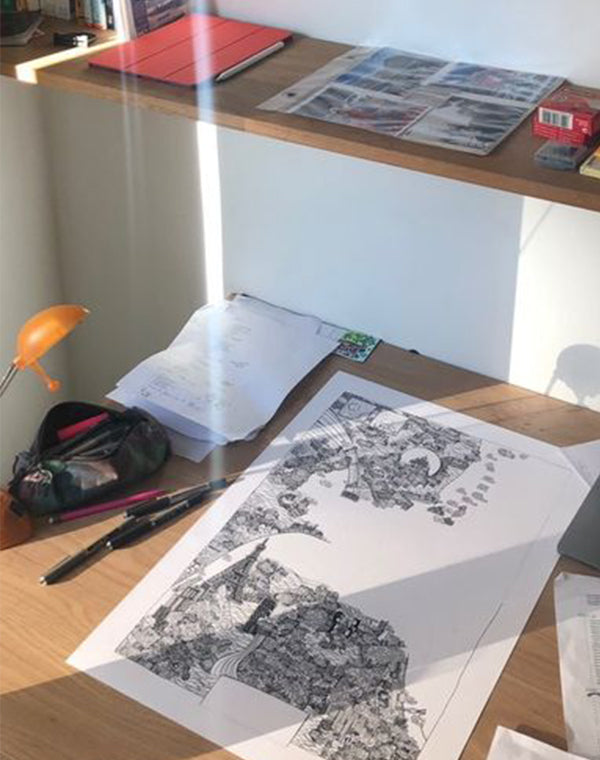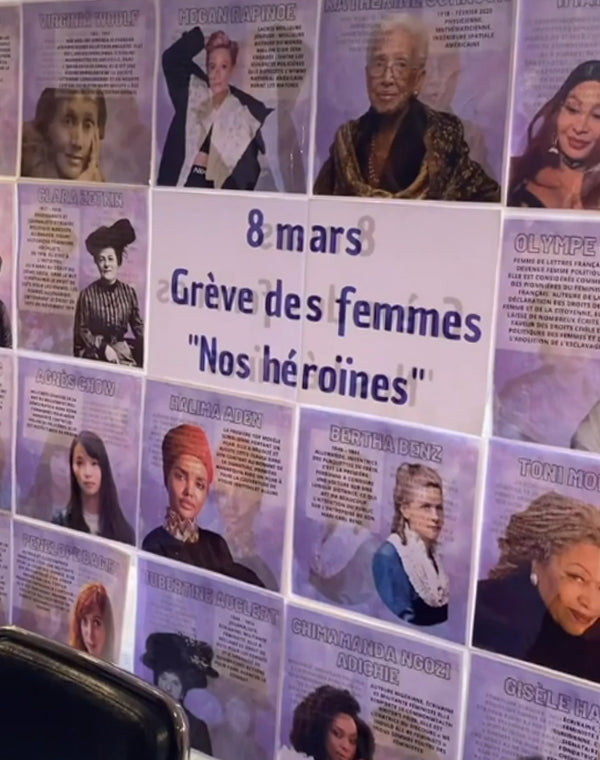
In a deceptively naive universe rooted in his passion from a young age for cartography, the designer Alexis Carlier turns the traditional representations of the capital upside down with his poster entitled "Feminine Paris". This map identifies all public places bearing a woman's name and reveals major inequalities.
Meeting with the illustrator.
"When women's names take a back seat, it has a huge impact on a woman's ambitions."

Can you introduce yourself in a few words?
My name is Alexis Carlier, I'm 25 years old and I've been drawing cards out of passion since my childhood. After studying sociology, I gave free rein to my interest in cartography and today publishes maps of French cities, Berlin, Tokyo, Sydney... starting from the layout of metros and trams. My illustrations are made by hand, from a 2D drawing sketched over several weeks in black Uniball pen. The colors were then added via Photoshop. The printing is of high quality on a 250g semi-matt (satin) coated paper.
The idea was born when I was walking down the street with a friend, in the 20th arrondissement, where I live. I realized that I was surrounded only by men's names. I then embarked on a long census work to bring the subject differently by using my skills.

How did you identify all the spaces bearing the name of women? Was the operation tedious?
I started from scratch. I have also listed on Google Maps all the public places in Paris bearing the name of a woman (in 09/2021). Then, I drew district by district a new original map of Paris.
The result is a rather blatant finding: only 12% of street names are given to women, compared to 66% to men. Most of the time, there are only secondary axes. I estimated the share of avenues at 1% and the share of squares or promenades at 50%, it's very unbalanced.
Some stories are particularly inspiring, even if they all are. I particularly have in mind the Place Olympe de Gouges. Marie Gouze, known as Olympe de Gouges, born May 7, 1748 in Montauban, and died guillotined November 3, 1793 in Paris, is a French woman of letters, who became a politician. She is considered one of the pioneers of French feminism. Author of the Declaration of the Rights of Woman and of the Citizen, she left numerous writings and pamphlets in favor of the civil and political rights of women and the abolition of black slavery. Also the Marielle Franco Garden. Marielle Franco, defender of the cause of black women living in a slum, lesbian, of the Socialism and Freedom Party (PSOL), the 5th elected municipal councilor of the city of Rio de Janeiro since January 2017 was killed by several bullets in March 2018 . All the indications lead to believe that it is about an execution of policemen dissatisfied with the work for the human rights carried out by Marielle.
There are also many steps in this direction. In its resolution, the ESEC encourages local authorities to highlight the "heritage", namely the contributions of women to the construction and history of cities. Awareness of the issue of gender in the public space owes a lot to the mobilization of associative actors and actresses who have developed innovative approaches: The Genre et Ville association is carrying out the "Egalitarian City" project in partnership with the municipality of Villiers-le-Bel.
The Womenability association highlights the best inclusive practices of cities and organizes exploratory walks. At the beginning of March 2019, in Paris, the Collectif #NousToutes launched a large-scale operation by sticking nearly 1,400 fake plates bearing the names of women under Parisian street signs.

How did you come up with the idea of collaborating with La Maison des femmes?
I wanted to help while letting women speak. The Maison des Femmes de Saint-Denis is a pioneer in supporting women who are victims of domestic violence. Created in July 2016 by Dr Ghada Hatem, at the entrance to the Delafontaine Hospital Center in Saint-Denis, La Maison des Femmes is a unique place of care for all women in difficulty or victims of violence. Open directly onto the street, it offers a confidential and secure welcome. From the request for contraception through abortion, care around excision, rape or physical or psychological violence, in the family, marital or other context, the teams of La Maison des Femmes offer care most appropriate and current.
You donate a significant and meaningful % to the Maison des femmes: what funds have been collected to date thanks to the sale of this poster? Did this project live up to your expectations?
The percentage donated is indeed particularly symbolic, 16.8% is the wage gap between women and men. It is a way to show the work carried out in this place of refuge, highlighted as that of feminist associations campaigning for the feminization of public space. Since the Paris Feminine poster was published and put on sale, nearly €2,000 has been donated to the Maison des femmes! The collaboration is going very well.
"This drawing is a bit out of reality and allows us to transcribe the changes underway, since Paris has gone from 6 to 12% of women's names with Anne Hidalgo's policy in recent years. "
Yes, as soon as I return from my trip, I publish a map of Paris Nation-Montreuil and a secret map, a new committed project: Queer-city, a map on which I bring together all the emblematic LGBTQI+ neighborhoods in the world. 15% of sales will be donated to the ARDHIS association which helps LGBT refugees in France to obtain the right of asylum.
